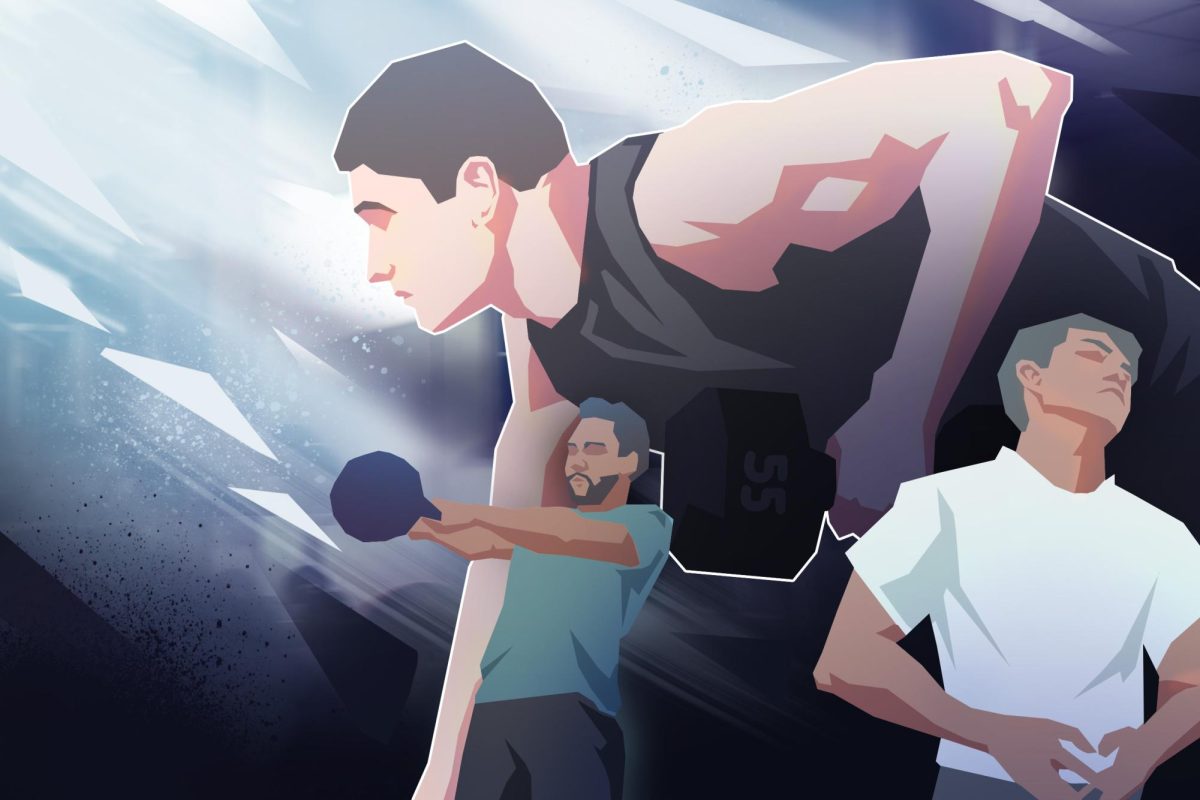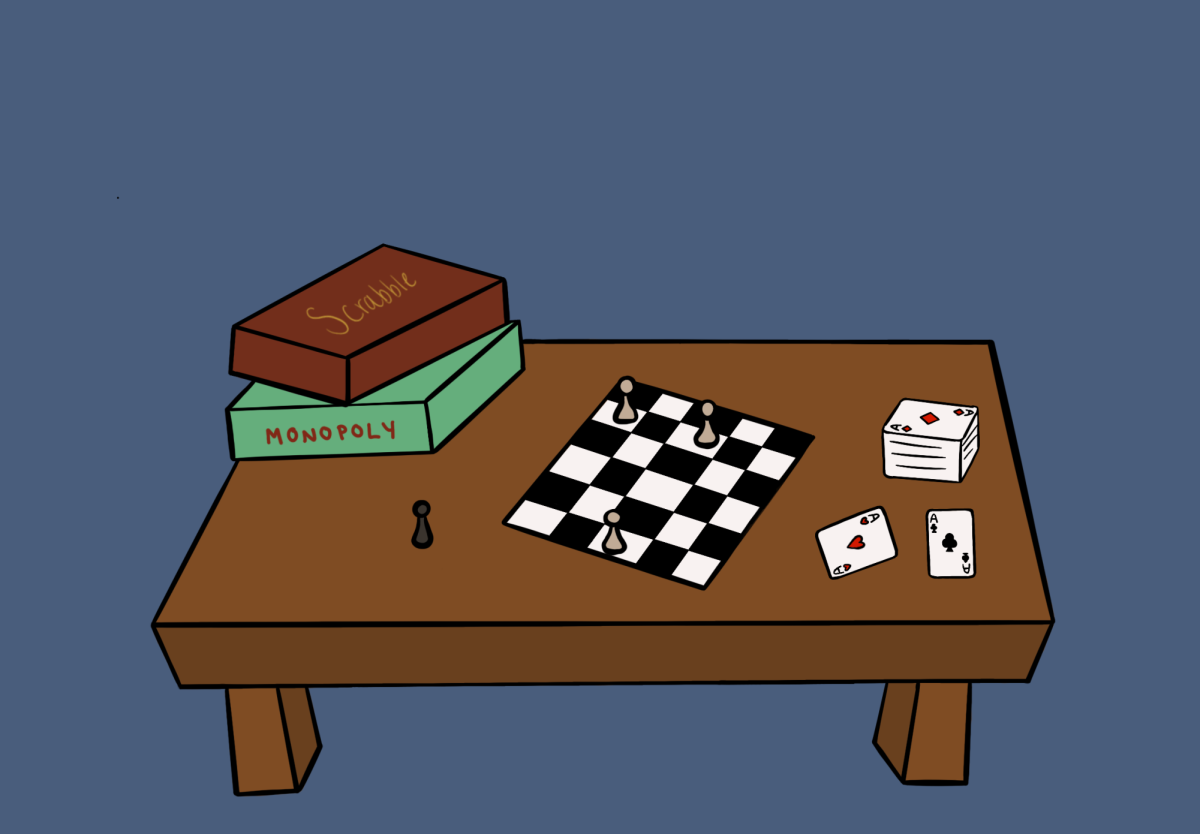Hitting the gym daily, weighing oatmeal for breakfast, downing scoops of protein powder and chugging pre-workout are all pillars of the “gym bro” culture.
Young men often look up to fitness influencers and view their videos as guides to achieve their ideal physique. These influencers stress pushing themselves past their limit, claiming there are no excuses for not being in the gym. Such practices have become the norm for “gym bros,” a term coined by social media for someone whose life revolves around strenuous fitness and markets itself as wellness and goal-setting. However, despite the positive branding, the practices of measuring food, obsessing over calories and cutting or bulking are behaviors consistent with eating disorders. If proponents of “gym bro” culture want it to persist, it must first evolve into a culture promoting a balanced approach to health.
Contrary to popular belief, eating disorders extend further than simply skipping a meal — they are behavioral conditions characterized by a severe and persistent disturbance in eating behaviors. These conditions are also often associated with distressing thoughts and emotions. As it currently stands, the “gym bro” culture promotes unhealthy health obsessions and normalizes eating disorders among men.
Extreme exercise combined with specific food consumption regimens often serve as starting points for eating disorders. Bodybuilders use cutting and bulking techniques to gain muscle and lose fat quickly. Bulking is when one overeats and consumes excess calories to gain body mass while cutting is when one eats low-calorie foods to maintain a caloric deficit and burn fat.
Cutting and bulking promote an obsession with food intake and its effect on the physical appearance of one’s body. Bulking can often lead to binge eating disorders, as it promotes eating large amounts of high-calorie foods for an extended period. Cutting is similarly harmful, as it encourages under-eating by restricting oneself to low-calorie foods. The overfixation between food and one’s physical appearance fosters a dangerous relationship with food, which can lead to mental strain.
Contrary to “gym bro” beliefs, cutting and bulking is the antithesis of a long-term, healthy fitness journey. A balanced fitness journey consists of consuming cleaner, less processed food alternatives and trying to change one’s lifestyle to incorporate daily exercises. Cutting and bulking are forms of extreme dieting and binging, which cross into fad diet territory. A fad diet is a popular dietary pattern known to cause quick weight loss with severe consequences in the long run. Cutting and bulking is a quick fix, but it isn’t sustainable for an extended period.
Video after video of buff men lifting and meal prepping is at the forefront of “gym bro” online culture. These posts often target young men, convincing them there’s only one acceptable body: an extremely muscular and lean one.
“I think that there is underlying toxicity in the community,” said junior Sophie Counts. “This is the ideal body type to these adolescents, but this physique is only doable if you’re taking steroids or if you’re a grown man, which is just not possible for the kids that are 16.”
While fitness culture promotes discipline, motivation and muscular development, the extreme physical and mental damage of such a culture overshadows the positive aspects. Focusing on purely physical goals and ignoring one’s external and internal health leads to obsessive practices. There are many ways to have a balanced approach to fitness that allow people to maintain muscle mass, discipline and motivation without sacrificing their mental and physical wellbeing. Taking a day off, not stressing about the amount of calories in a meal and eating for enjoyment rather than for gain are healthy practices. People can still reach their fitness goals without subjecting themselves to physical and mental anguish.
Instead of promoting intense videos of buff men lifting and calling people lazy, “gym bro” culture needs to transform into a space that advocates a healthy and balanced approach to fitness. Creating a community built on the collective strive for healthy fitness practices will generate a group of strong individuals, both physically and mentally.



















Anonymous • Jan 31, 2024 at 2:25 pm
While “gym bro” culture can embrace unhealthy extremes, it also fosters discipline, community, and self-improvement for many. Let’s move beyond stereotypes and acknowledge its potential for good. Responsible practices, informed choices, and a focus on well-being can transform this movement into a force for balanced fitness for all, not just the buff bros on your screen.
anonymoist • Feb 1, 2024 at 10:21 am
katelyn would not approve of this
HENHEN DURESS( DRAKE POESTER) • Jan 30, 2024 at 11:01 am
horrible take
John Doe • Jan 31, 2024 at 2:27 pm
While I understand the argument about the negative effects of extreme dieting – both gaining and losing weight rapidly – the term “bulking” or cutting, does not mean excessive gaining or loss of weight. In order to gain muscle, one needs to increase their caloric intake to have the energy to build new muscle fiber. Contrary, if one wants to lose fat, they need to decrease their caloric intake to less than what they burn in a day. These simple processes, in slang, are called “Bulking” and “Cutting.” The article claims that behaviors of cutting and bulking are consistent with eating disorders, but unless you control the amount, type and quality of food you consume, it is impossible to achieve meaningful result.
This article did not include any quotes from the toxic “gym bro” community members themselves. The only negative quote was from Sophie Counts. A junior girl. I would love to see some quotes from people who suffered mental damage as the result of the “toxic” community before claiming that the “extreme physical and mental damage of such a culture overshadows the positive aspects.”
james yin • Feb 9, 2024 at 8:12 am
well said john doe going above or below your maintenance calories to put on muscle or lose fat respectively is not an “eating disorder”, and is most definitely not the “antithesis of a long-term, healthy fitness journey”
james • Feb 9, 2024 at 7:47 am
i agree